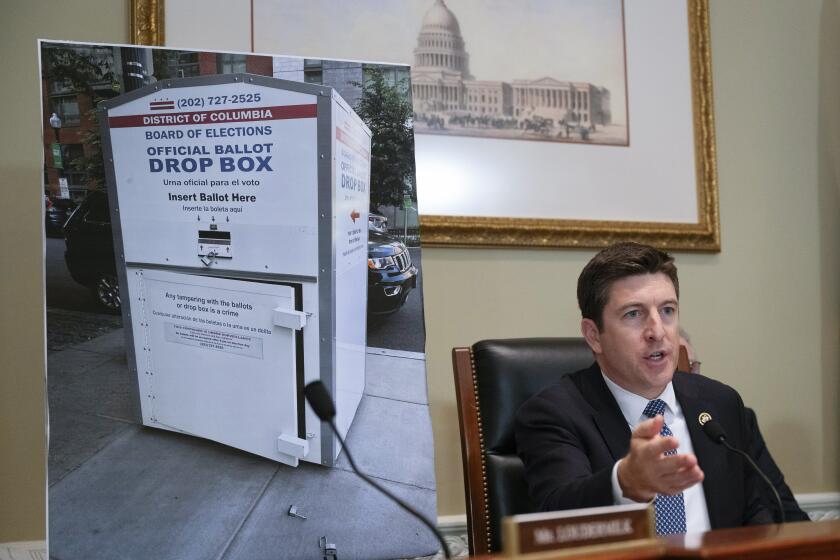Deaf L.A. Peddlers Say They Know N.Y. Sellers
The deaf peddlers at Los Angeles International Airport know all about New York City and the bad jefes who did business there, the “king peddlers” who allegedly kept more than 50 Mexican immigrants in crowded apartments as virtual indentured servants.
Asked about the New York trinket-selling operation of the Paoletti family, one of the Los Angeles peddlers wrote in a reporter’s notebook: “No me gusta N.Y.” (I don’t like New York.)
Both the Paolettis and their alleged victims are well-known among deaf Mexican immigrants in Southern California, a community scattered in pockets from central Los Angeles to suburbs such as Santa Ana but probably numbering in the thousands.
For every one of the reported victims of the alleged New York ring, there are many other deaf immigrants who have come to the Los Angeles area, earning from $20 to $70 a day selling trinkets such as key chains and pencils in airports, malls and restaurants.
The way acquaintances and relatives here tell it, Jose Paoletti Lemus--a deaf man arrested in New York last week along with his wife, mother, sister and a cousin--launched the enterprise in Los Angeles about a decade ago. He relocated to New York in about 1990 with a dozen or so vendors after a series of disputes with other peddlers, according to deaf merchants here.
“They didn’t treat people well,” said Pablo Rea, a deaf acquaintance of the Paolettis who lives near La Puente.
Among other things, Rea said, Paoletti and several associates were accused of pocketing too much of the profit for themselves.
Federal officials investigating the New York case have said they are exploring the Paolettis’ ties in California.
But it remains unclear whether authorities will find a group subjected to similar alleged mistreatment in Los Angeles. Deaf peddlers interviewed here said they knew of no such extreme conditions as those alleged in New York.
Nonetheless, many deaf Mexican families living in Southern California have either worked for, crossed paths with, or are related to the Paoletti family.
Monica Lozano, a 27-year-old resident of Mexico City visiting deaf relatives in Los Angeles, said she had seen Renato Paoletti--Jose’s brother and the alleged New York ringleader, now a fugitive--last Saturday at a party in Mexico City.
“In deaf circles,” Lozano said, “everyone knows everybody.”
Inundated with leads on exploited deaf immigrants from North Carolina to Chicago, the Immigration and Naturalization Service announced Thursday the formation of a National INS Anti-Exploitation Task Force, based in Washington.
The task force will examine the leads and anecdotal information about similar cases of “abuse, coercion and extortion of immigrants” nationwide, said INS Commissioner Doris Meissner.
A dozen or so peddlers interviewed this week said they knew the Paolettis as unscrupulous bosses. Lawyers defending the family in New York have denied any wrongdoing. The fact that no one stepped forward to alert authorities about the alleged abuse in New York until last week may be a measure of the isolation and insular nature of the deaf immigrant community.
In Los Angeles, a city replete with immigrant street vendors of every stripe, the deaf peddlers live in a world apart, a truth illustrated when a reporter not conversant in sign language tried to conduct an interview with eight peddlers at the airport.
Most of the group--all men in their 20s and early 30s--live in suburban Whittier and Santa Ana. They commute to the airport and malls “everywhere” to work, selling small trinkets for $1 each, sharing the proceeds with a boss whom they say they respect. Some seemed barely literate, struggling to spell words, writing in convoluted Spanish syntax.
When the reporter first approached the group with the written message “I am a journalist,” one of the deaf peddlers seemed agitated and wrote back “Muy mal” (very bad).
The reporter interpreted this as a sign of fear. But it soon became apparent that the peddlers simply wanted to express their outrage at the reports of abuse emanating from New York.
One peddler brought his hands together to form a roof, alleging that, while working for the Paolettis, he had been forced to give up his earnings in exchange for living quarters.
With each vendor soliciting hundreds of potential customers each day, it is easy to understand how unscrupulous entrepreneurs could enrich themselves even in a world of $1 sales. Authorities charge that the Paolettis demanded virtually all their employees’ earnings.
Many of the airport salesmen said they knew one of the alleged New York victims and pointed to his picture in the Spanish-language newspaper La Opinion. “He’s 17,” one of the peddlers wrote.
When asked if the boss they work for in Los Angeles is a “good” jefe, one of the men pointed to his wedding ring: He is married to her.
Marcella Meyer of the Greater Los Angeles Council on Deafness described the relationship between the sellers and “king peddler” as similar to “an employer and employee. There are some bad employers and some good ones.”
The trade is a common one among the deaf in Los Angeles--and not only among immigrants--because of the limited job opportunities for the hearing-impaired, Meyer said.
“We have not had the access that provides us with equal opportunities in schools, in the job market, you name it,” noted Meyer.
The nature of the trinket sales businesses varies, workers said.
Some groups work for a boss who supplies materials and keeps a certain percentage of the profits--50% is common, vendors said.
Others toil solo, purchasing their own supplies and keeping all their profits, though they may pool resources with others to purchase merchandise at wholesale shops in downtown Los Angeles. Arturo Ruiz is one of those who says he works for himself. He shares a rented home with a half-dozen or so other deaf Mexican immigrants near suburban La Puente. Ruiz, 23, who arrived from Veracruz seven years ago, says only about one in 20 of the prospective purchasers he approaches actually buy his $1 trinkets, usually ball-point pens. Yet Ruiz says he regularly manages to make up to $70 a day.
“It takes a lot of courage to do at first,” Ruiz said through a sign interpreter during an interview at his home. “Some hearing people treat you like you’re stupid.”
Like a number of others interviewed, Ruiz is taking classes in English and sign language. He hopes to continue his education and find a better job. Prospects for such self-improvement, vendors said, are seldom available in Mexico.
“Living in Mexico is like living in ignorance,” said Alberta Dimas, 28, a deaf vendor who arrived last year, having lost hope for improvement in Mexico.
The vendors often work 12-hour days, typically beginning about noon and ending near midnight. Since most are unlicensed, the possibility of police harassment is a constant concern.
While vendors say the Paoletti family moved the business to New York some time ago, officials charge that the family continued to recruit new salespeople in both Mexico and California--a practice that authorities say probably continued until recently.
At LAX, the group of eight peddlers found time to take a 30-minute lunch break, talking with quick and elegant movements of their fingers, hands and arms.
When their break was over, they split into groups of two and began to fan out across the airport. They were a neatly dressed bunch, mostly in jeans, and carried their wares--small globes with key chains attached--in waist packs and backpacks.
Sales to customers all took place in silence, women opening their purses and holding out bills without saying a word, the peddler responding by raising his hand to his chin, then extending it forward, the sign for “thank you.”
It was a gesture that few of the customers looked at or understood.
Times staff writer John J. Goldman in New York contributed to this story.
More to Read
Start your day right
Sign up for Essential California for news, features and recommendations from the L.A. Times and beyond in your inbox six days a week.
You may occasionally receive promotional content from the Los Angeles Times.






